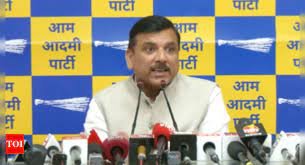The Aam Aadmi Party (AAP) has made serious allegations against officials from the Enforcement Directorate (ED) and the Central Bureau of Investigation (CBI), accusing them of pressuring witnesses to provide statements in the Delhi excise policy case. The party claims to possess evidence that exposes what it calls a conspiracy against the AAP and its national convenor, Arvind Kejriwal. The allegations have sparked a heated political debate and raised concerns about the integrity of the investigative agencies involved.
According to the AAP, ED and CBI officials have been intimidating witnesses in order to extract statements that would implicate the party and its leaders in wrongdoing. The excise policy case revolves around alleged irregularities in the Delhi government’s liquor policy, and the AAP believes that the central agencies are attempting to tarnish its image by manufacturing false evidence.
The party has expressed confidence in its possession of proof supporting its claims. However, it has not disclosed the nature of the evidence or when it intends to reveal it. The AAP has vowed to expose the alleged coercion at the appropriate time, signaling its readiness to confront the investigating agencies head-on.
These accusations have triggered a strong reaction from both supporters and critics of the AAP. Supporters argue that the allegations are a clear indication of political vendetta and an attempt to undermine the party’s reputation. They view it as part of a larger pattern of targeting the AAP, as it has faced numerous confrontations with the central government in the past.
On the other hand, critics have raised questions about the AAP’s motive for making such claims and have demanded transparency in the matter. They argue that if the party possesses concrete evidence, it should present it immediately instead of waiting for an opportune moment. Skeptics suggest that the AAP might be using these allegations to deflect attention from the ongoing investigations into the excise policy case.
The allegations against the ED and CBI officials have further strained the already fragile relationship between the AAP-led Delhi government and the central government. The AAP has been critical of the central government’s interference in Delhi’s affairs, often accusing it of attempting to destabilize the elected government.
The ED and CBI, as premier investigative agencies, have been entrusted with upholding the law and ensuring justice. However, the recent allegations, if proven true, would raise serious doubts about the agencies’ impartiality and professionalism. The matter warrants a thorough investigation to ascertain the veracity of the AAP’s claims and to restore public trust in these institutions.
Given the gravity of the allegations, it is essential for an independent and unbiased investigation to be conducted. The credibility of the ED and CBI is at stake, and a transparent inquiry will help maintain the integrity of these agencies. Additionally, the AAP should be encouraged to present its evidence promptly to facilitate a fair resolution of the matter.
In a democratic society, it is crucial to ensure that the rule of law prevails and that no one is above it. Public confidence in the investigative agencies is essential for the functioning of a just and fair system. The outcome of this case will not only impact the AAP and its leaders but will also have far-reaching implications for the perception of justice and accountability in India.


